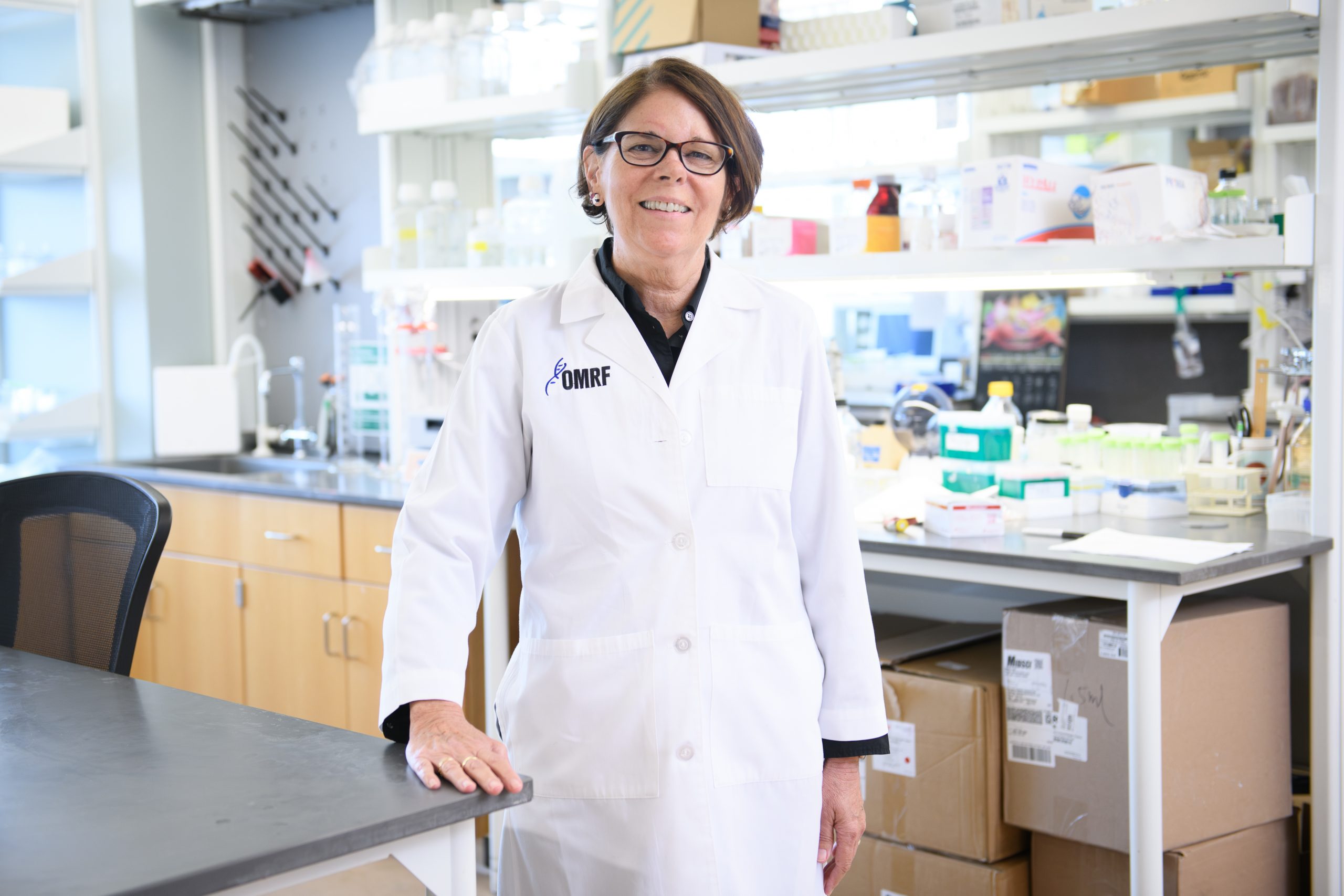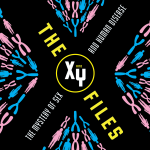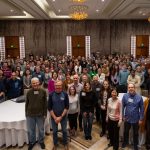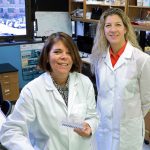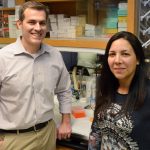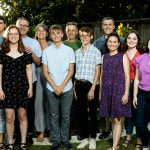Susan Kovats, Ph.D.
Professor Emeritus
Arthritis & Clinical Immunology Research Program
Adjunct Associate Professor, Department of Microbiology and Immunology, University of Oklahoma Health Sciences Center
My 101
Optimal immunity upon respiratory infection depends on lung-resident immune cells. These cells are the first responders to infectious agents, allergens or tissue damage at the lung barrier. We use murine models and human engineered lung tissue models to understand how these resident immune cells respond to infection by influenza virus and respiratory syncytial virus. This new knowledge will help in vaccine design and to understand differences in neonatal and adult immunity.
We are particularly interested in sex differences in immunity. Women often experience a more severe course of influenza virus infection and make up more than 80 percent of patients with autoimmune disease. Cells in the immune system have sex hormone receptors, places that estrogen and androgen can attach and trigger responses, so we know that sex hormones play a role in the system’s function. Our focus is to determine what that role is and how to apply that knowledge to disease.
By learning more about how sex-related hormones like estrogen and androgen impact the immune response, we hope one day to apply that knowledge to fight autoimmune diseases that preferentially affect women such as lupus and Sjögren’s syndrome.
Research
Tissue-resident cells of the innate immune system are the first responders upon infection or tissue damage at mucosal barrier sites. We use a murine model of influenza virus infection to understand the specific roles of lung resident dendritic cells and innate lymphocytes in antiviral responses. We also work with a tissue-engineered lung model in which human respiratory tract myeloid cells are exposed to respiratory syncytial virus, with the goal of understanding differences in neonatal and adult immunity. Our newest project will explore mechanisms by which sepsis induced by Gram-positive bacteria leads to immunosuppression.
Females often experience increased morbidity upon influenza virus infection, as well as increased incidence and severity of autoimmune disease and asthma. A major focus of the lab is to understand sex differences in numbers and function of innate type 2 lymphocytes (ILC2s) in homeostasis and upon inflammation. We published that female mice harbor significantly greater numbers of lung ILC2s in homeostasis, and we would like to understand how this sex difference contributes to ILC2 responses during infection and inflammatory disease. Ongoing projects will dissect the molecular basis of the differential regulation of female and male ILC2s by inflammatory stimuli and sex hormones in a model of influenza virus infection. This project also will help us to understand the female predominance of autoimmune disease.
We also seek to understand how lung-resident dendritic cells (DCs) regulate T cell memory responses to influenza virus. Acute respiratory disease caused by influenza viruses is imperfectly mitigated by annual vaccination to select strains. Understanding how DCs regulate resident memory CD8+ T cells will aid the development of vaccines that elicit more universal protection to seasonal and emerging pandemic viruses. Mice lacking lung-resident IRF4-dependent DCs showed defective CD8+ T cell memory responses, and ongoing experiments will investigate IRF4-regulated pathways in DCs that promote T cell memory. Our work suggests that vaccination strategies to harness the function of IRF4-dependent DCs could promote the development of CD8+ resident memory T cells during influenza infection.
Brief CV
Education
B.A., University of California, Berkeley, 1984
Ph.D., University of Wisconsin, Madison, 1991
Honors and Awards
Honor Scholarship, University of California, Berkeley, 1983
Wisconsin Alumni Research Foundation Fellowship, 1984-1985
National Science Foundation Graduate Fellowship, 1985-1988
Scholar, designated by the American Society for Histocompatibility and Immunogenetics, 1989
Leukemia Society of America Fellowship, 1993-1994
National Research Service Award – individual fellowship, 1994-1997
Arthritis National Research Foundation fellow, 1998-1999
Arthritis Foundation Investigator Award – Duggan Award, 1999-2004
Arthritis National Research Foundation fellow, 2004-2005
J. Donald and Patricia Capra Award for Scientific Achievement, 2020
Other Activities
Associate Editor, The Journal of Immunology, 2001-2005
Editorial board member, Current Immunology Reviews
Ad-hoc member, NIH special emphasis and CMI-A, CMI-B, LCMI grant review panels
Ad-hoc reviewer for scientific journals
AAI Committee on the Status of Women, 2013-2016
Adjunct Associate Professor, Dept. of Microbiology & Immunology, OUHSC
Memberships
American Association of Immunologists
American Association for the Advancement of Science
Society for Mucosal Immunology
Organization for the Study of Sex Differences
Joined OMRF scientific staff in 2005
Publications
Recent Publications
Keshari RS, Silasi R, Byrum SD, Popescu NI, Regmi G, Abe T, Lupu C, Georgescu C, Taylor VE, Province D, Edmondson RD, Mackintosh SG, Avaritt NL, Kovats S, Farris AD, Simmons JH, McCarty OJT, Tackett AJ, Lupu F. Anthrax Toxins Exacerbate Sepsis-Induced Coagulopathy and Endothelial Dysfunction in a Baboon Model of Anthrax. J Thromb Haemost, 2025 November, PMID: 41192570, PMCID: PMC12794561
Seaberg J, Gulla SK, Labombarde J, Roy R, Dwivedi SKD, Xu C, Kovats S, Bhattacharya R, Mukherjee P. Enhancing mRNA therapy through iterative delivery. Sci Adv 11:eadx0916, 2025 October, PMID: 41032607, PMCID: PMC12487881
Wu W, Alexander JS, Booth JL, Chlebicz M, Miller CA, Xu C, Kovats S, Metcalf JP. CYP1B1 knockout enhanced IFN-γ production is required but not sufficient for protection of cigarette smoke-exposed mice against lethal influenza virus infection. Front Immunol 16:1600025, 2025 July, PMID: 40688072, PMCID: PMC12271145
Selected Publications
Kadel S, Ainsua-Enrich E, Hatipoglu I, Turner S, Singh S, Khan S, Kovats S. A major population of functional KLRG1– ILC2s in female lungs contributes to a sex bias in ILC2 numbers. Immunohorizons. 2018 Feb;2(2):74-86. PMID: 29568816 PMCID: PMC5860819
Bajaña S, Turner S, Paul J, Ainsua-Enrich E, Kovats S. IRF4 and IRF8 Act in CD11c+ Cells To Regulate Terminal Differentiation of Lung Tissue Dendritic Cells. J Immunol. 2016 Feb 15;196(4):1666-77. Epub 2016 Jan 8. PMID: 26746189 PMCID: PMC4744567
Kovats S, Turner S, Simmons A, Powe T, Chakravarty E, Alberola-Ila J. West Nile virus-infected human dendritic cells fail to fully activate invariant natural killer T cells. Clin Exp Immunol. 2016 Nov;186(2):214-226. Epub 2016 Sep 22. PMID: 27513522 PMCID: PMC5054575
Kovats S. Estrogen receptors regulate innate immune cells and signaling pathways. Cell Immunol. 2015 Apr;294(2):63-9. PMID: 25682174 PMCID: PMC4380804
Bajaña S, Roach K, Turner S, Paul J, Kovats S. IRF4 promotes cutaneous dendritic cell migration to lymph nodes during homeostasis and inflammation. J Immunol. 2012 Oct 1;189(7):3368-77. PMID: 22933627 PMCID: PMC3448873
Carreras E, Turner S, Frank MB, Knowlton N, Osban J, Centola M, Park CG, Simmons A, Alberola-Ila J, Kovats S. Estrogen receptor signaling promotes dendritic cell differentiation by increasing expression of the transcription factor IRF4. Blood. 2010 Jan 14;115(2):238-46. PMID: 19880499 PMCID: PMC2808152
Contact
Arthritis & Clinical Immunology Research Program, MS 24
Oklahoma Medical Research Foundation
825 N.E. 13th Street
Oklahoma City, OK 73104
Phone: (405) 271-8583
Fax: (405) 271-7063
E-mail: Susan-Kovats@omrf.org
For media inquiries, please contact OMRF’s Office of Public Affairs at news@omrf.org.
Lab Staff
Mandi Roe, Ph.D.
Senior Postdoctoral Scientist
Sean Turner
Senior Manager Laboratory
Jocelyn Labombarde
Graduate Student
Abigael Williams
Graduate Student
Nyeisha Caldwell
Administrative Assistant III
News from the Kovats lab
As a resurgent H1N1 flu virus worries medical professionals and families, more people are looking to vaccines to keep them safe. Now a new discovery by scientists at OMRF could shed light on why vaccines are ineffective in some patients. In a paper published in the current issue of the Journal of Biological Chemistry, OMRF researchers Shikha […]
Four scientists from some of the nation’s leading research institutions have joined the faculty of the Oklahoma Medical Research Foundation. The new researchers bring additional strength to OMRF’s research in cancer, genetic disorders and immunology. Susannah Rankin, Ph.D., and Dean Dawson, Ph.D., come to OMRF from Boston, where Rankin studied cell division in the Systems […]
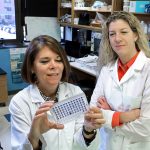
Using 3D Models to Tackle Respiratory Illness Respiratory syncytial virus is the leading cause of pneumonia worldwide. It takes a particularly heavy toll on children, infecting more than half in the first year of life and nearly 100 percent by age 2. “RSV causes more frequent and more severe infections in infants, compared to adults, […]
